“But of those decadent ages in which no Ideal either grows or blossoms? When Belief and Loyalty have passed away, and only the cant and false echo of them remains; and all Solemnity has become Pageantry; and the Creed of persons in authority has become one of two things: an Imbecility or a Macchiavelism? Alas, of these ages World-History can take no notice; they have to become compressed more and more, and finally suppressed in the Annals of Mankind; blotted out as spurious,—which indeed they are. Hapless ages: wherein, if ever in any, it is an unhappiness to be born. To be born, and to learn only, by every tradition and example, that God’s Universe is Belial’s and a Lie; and “the Supreme Quack” the hierarch of men! In which mournfulest faith, nevertheless, do we not see whole generations (two, and sometimes even three successively) live, what they call living; and vanish,—without chance of reappearance?”1Thomas Carlyle, History of the French Revolution, Chapter I, Page 14. Thoughts. (Gutenberg Library Project).
This is precisely what Mikhail Gorbachev freed us — his contemporaries — from. He liberated us. And he did this of his own volition. We didn’t even ask him. At the time only a miniscule number of people were fighting for freedom, while even fewer believed that this was actually possible. Gorbachev gave us all freedom. He is not to blame for what we did with this freedom. It is not even his concern. This is our responsibility. Accordingly, we can also stop right here when contemplating his contribution. For in history this has happened peacefully only once — thanks to Gorbachev.
* * *
Mikhail Gorbachev held real power as head of state for just over six years. We could spend a long time analysing in detail what he managed to do during this time and what he failed to achieve. However paradoxical this may sound, Gorbachev’s main achievement is what he opted not to do. For he did not follow in the footsteps of all Soviet leaders who had significant prowess in this area: Gorbachev did not try to control the population through fear and intimidation. And even though almost three decades have passed since the resignation of the first and last President of the USSR, Mikhail Gorbachev remains even today an extremely important figure for the here and now and for any conversations on our country’s future.
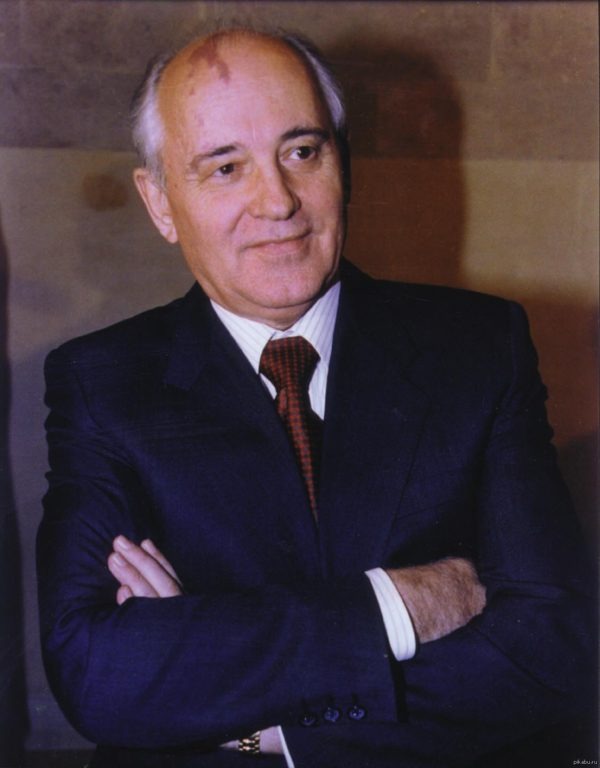
Mikhail Gorbachev
The year 1989 is an obvious turning point in modern history2See: 30 Years after Communism. Contours of a New Era, November 2019.. Recently a number of articles, research papers and even books have been dedicated to the 30—year anniversary of these events. The overall tone of these publications can be summed up as misplaced hopes, unrealised opportunities, missed goals, or to put in a nutshell, “the light that failed” (Ivan Krastev and Stephen Holmes used recently the title of Rudyard Kipling’s novel “The Light That Failed” for their book on the hopes and reality of the past three decades in Eastern Europe3 The Light that Failed: A Reckoning, by Ivan Krastev and Stephen Holmes, Allen Lane, 2019.). However, hardly anyone doubts the critical importance and definitive watershed moments of the fall of the Berlin Wall, the liberation of Eastern Europe from communism and the democratisation of the USSR. And it is namely Gorbachev who played the key role in these events.
During his reign Gorbachev succeeded in laying the foundation for a new era. And the reasons for today’s global problems and crises are to a large extent attributable to the end of the era unleashed by Gorbachev 30 years ago: the new age of value-based thinking has been replaced by archaism, the windows of opportunity swung open at some point back then have now been slammed shut, and need to be opened again, and at some point new ones will have to be created. However, before this can be done, we need to evaluate and understand what was achieved or not achieved over three decades. And we should not execrate Gorbachev, but instead look first and foremost at ourselves and try to answer the question on how and why the opportunities opened up to us all at the end of the 1980s slipped through our fingers4 See: The Day After. September 2020..
Gorbachev provided Soviet citizens who had been afraid of saying a word with an opportunity to speak their minds without the fear of being shot, imprisoned, dismissed from work or even expelled from the Communist Party. And this phenomenon did not simply mean freedom of speech as one of many democratic freedoms, but rather existential liberation from a sense of fear — the very same fear that had been called in Russia at times contemptuously and at times justifiably — genetic.
The absolute majority of our citizens did not have to fight for this gifted freedom — this was achieved thanks to the sacrifices of the very few. A comprehensive realisation of this achievement did not follow. Russia proved unable to cope with such freedom: it had not learned to live without fear, did not avail itself of freedom for creativity, did not preserve, did not protect, did not multiply such freedom and as a result in the end lost it.
German reunification. Berlin, October 1990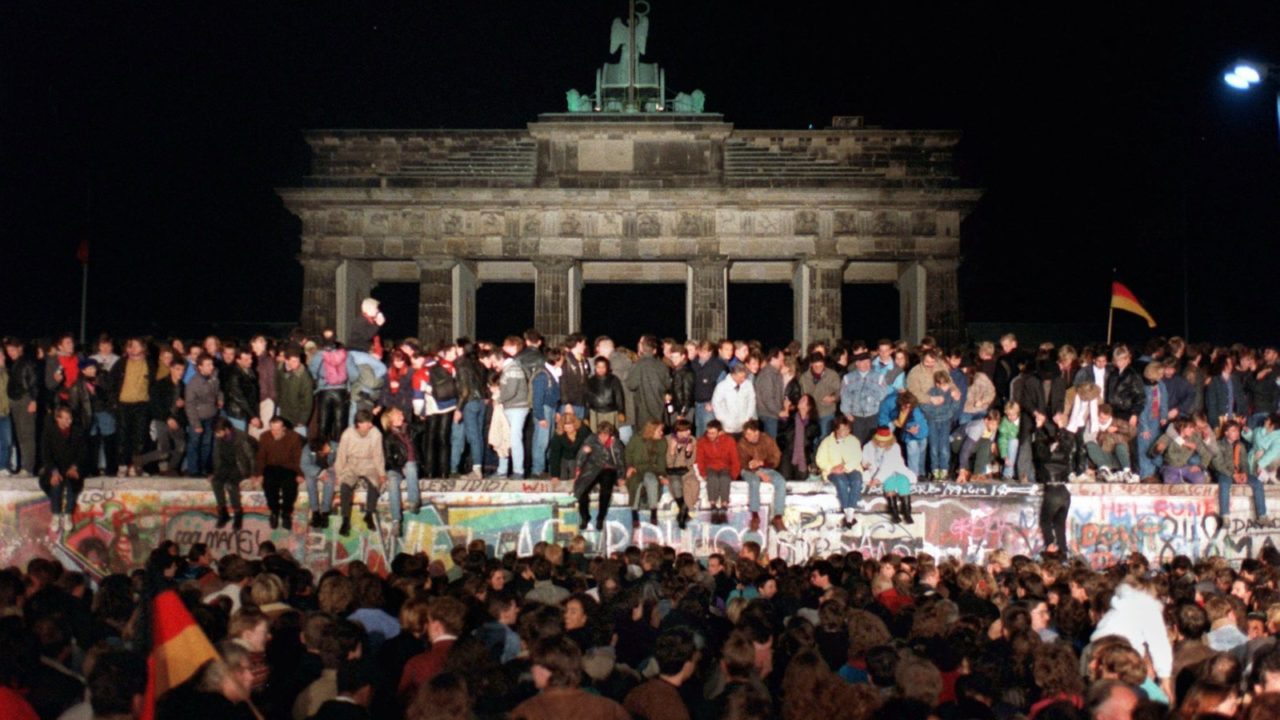
Today a large number of people in our country believe the developments in the second half of the 1980s to be a curse, rather than a blessing. However, back then, more than 30 years ago, millions and millions of Soviet citizens readily embraced freedom of speech that literally rained down on them. Criticism of the powers that be without fear of repressions, the unveiling of taboo topics, from “unexplored facts” of history to problem “blind spots” of the daily lives of Soviet society — all this was akin to rain falling on dry soil. The new information was instantaneously absorbed, and still more was demanded. The country, people and public consciousness craved freedom (at the very least, the freedom to speak out, listen, read and discuss) and the truth. Meanwhile, Gorbachev is not to blame for what happened to Russia over the past 30 years. From the perspective of freedom and respect for human rights, the era of post-Soviet reforms ended in utter failure, and the people living and working in this era are responsible for this fiasco. This concerns not only the politicians taking the decisions, but also rank-and-file citizens who had an opportunity to speak and act, choose and vote as they deemed necessary without any fear of repressions. Consequently everyone who let themselves be boxed again and again in the political stye of the regime’s endemic corruption and mendacity is responsible for the country’s regressive transformation on an equal footing with the people whom they allowed to adopt such decisions.
Incidentally, at the end of the 1980s, start of the1990s the peoples of the USSR were not the only ones to enjoy the taste of freedom. Europe was liberated from previous separation and confrontation of military blocs, and the whole world from the constant fear of a nuclear war. How Europe and the world exploited such freedom — that is a different matter entirely.
***
A while back President Putin, asked whether the Head of State should conceal from the public his children and grandchildren, said: “…Western political culture implies that family members have to take centre stage. I believe that we are not in a situation to engage in such theatrics. In our country, we should act like adults. Seriously”5 See: 20 Questions with Vladimir Putin, 18th Series, TASS..
In actual fact, Putin’s approach is not at all “adult”. He merely imitates Bolshevik models and practices. Even on this point, under Gorbachev everything was completely different.
The appearance of his wife Raisa with the General Secretary of the Communist Party of the Soviet Union was not “a copy of Western traditions”. It represented instead a break with the Bolshevik template where a person is merely a function, a cog in the machine, and any expression of human emotion is perceived as a weakness (the pure love and warmth of Mikhail and Raisa Gorbachev came shining through in the last days of the life of the first and only lady of the Soviet Union — when Gorbachev literally carried his wife dying from cancer in his arms).
The roots of current developments in our country can be traced back namely to the return of the Russian state to Bolshevik standards of political thinking and conduct. This is demonstrated by the dismantling of the Russian Constitution, the persecution of political opponents and interpretation of state sovereignty to mean simply “I can do whatever I want”, and the concept of a “multipolar world” based on this understanding, and the attempt to revive the policy of “limited sovereignty” in respect of neighbours. This is a deliberate regression to the past, a return to the pre-Gorbachev era.
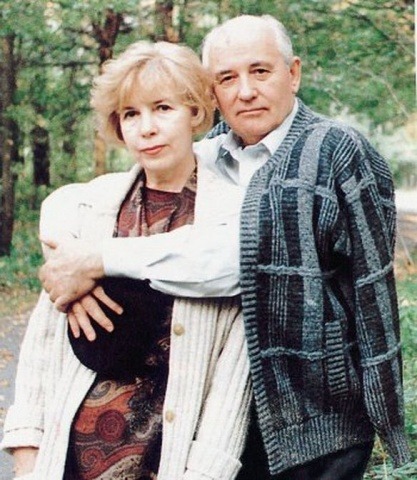
Mikhail and Raisa Gorbachev
Russia will have to pay dearly for rejecting the achievements of democracy in the late Soviet period, for eliminating everything that Gorbachev managed to do. One need merely cite the example of the destruction of arms deterrence treaties to understand the scale of the price of such a reversal6 See: The Threat of War, January 2020. .
In his last few months as Head of State and already after his resignation Gorbachev had to suffer a great deal: humiliation, virulent abuse and smear campaigns. However, he could not be broken. He managed to retain his dignity and remain a man, perhaps even brighter and more authoritative than when he had been in charge. Despite all the opportunities afforded to him, Gorbachev never left Russia: he stayed. To a large extent, he also remained a political figure. Now and then, the regime would ask his opinion. Gorbachev’s words were probably the only ones that the world was ready to hear from a country with a besmirched reputation7 See: Reputation Loss: Poisoned by Lies, September 2018. . Incidentally, if he had emigrated, then everything that he had achieved back then, all the changes that he had facilitated would have acquired a completely different meaning. Personally, I am forever grateful to Gorbachev for staying in Russia with his people.
It is true that a large number of people never liked Gorbachev and did not even try to understand and assess his contribution to the future. It goes without saying that such an attitude is wrong. For it is Gorbachev who granted people the freedom of choice, who enabled the peoples of the USSR — Ukrainians, Kazakhs, Latvians, Lithuanians, Estonians, Moldovans and many others whom he released from the “barracks” — to finally live as they want. Then in 1991 Russians themselves unreservedly supported the Belovezh Accords, Boris Yeltsin and the catastrophic reforms which had already led by the end of the following year to complete and universal destitution. This had nothing to do with Gorbachev.
Today once again the Russian people vote for Putin, for the lack of any economic policy, for a fall in real incomes for six years, for an increase in the pension age, judicial and extrajudicial crackdowns, an authoritarian constitution, the immutability of the regime, the destruction of the human rights organisation Memorial and the special military operation. Thirty years have passed since Gorbachev. During this time Russians have voted eleven times at federal elections when there was for all that still a choice. The people had an opportunity on eleven occasions to change the course of events and start the move towards freedom, truth and justice, to take the path that Gorbachev opened for the country. However, the majority made a different choice. So be it. That is the right of the people. However, if anyone is dissatisfied with how things are in modern Russia, then they should blame themselves, and not Gorbachev.
***
Gorbachev’s role in history, his contribution to perceptions of politics are extremely important and valuable, even if not so much for the present (unfortunately, the present has already been lost) as for the future. Gorbachev, his life and political legacy today have never been so relevant for the entire contemporary world. This is one component for new hopes about the future.
The state of the world today in all areas is far less stable and far more dangerous for mankind than the world bequeathed to us by Gorbachev. Consider this:
— He created a global nuclear security system. Today, however, this system has been virtually destroyed;
— He did a great deal for international unity during the resolution of global problems, while the current world is increasingly falling apart, demonstrating a lack of will when it comes to developing joint solutions;
— He set a direction for overcoming the gap between the Eastern and Western parts of Eurasia, with the potential for the creation of one value-based and economic space from Lisbon to Vladivostok. However, today Russia is moving in the opposite direction to European values, whereas Europe itself is being torn apart by nationalism and populism;
— He facilitated the peaceful dismantling of the Soviet totalitarian system, while today the authoritarian future of the USA has become a serious topic of debate.
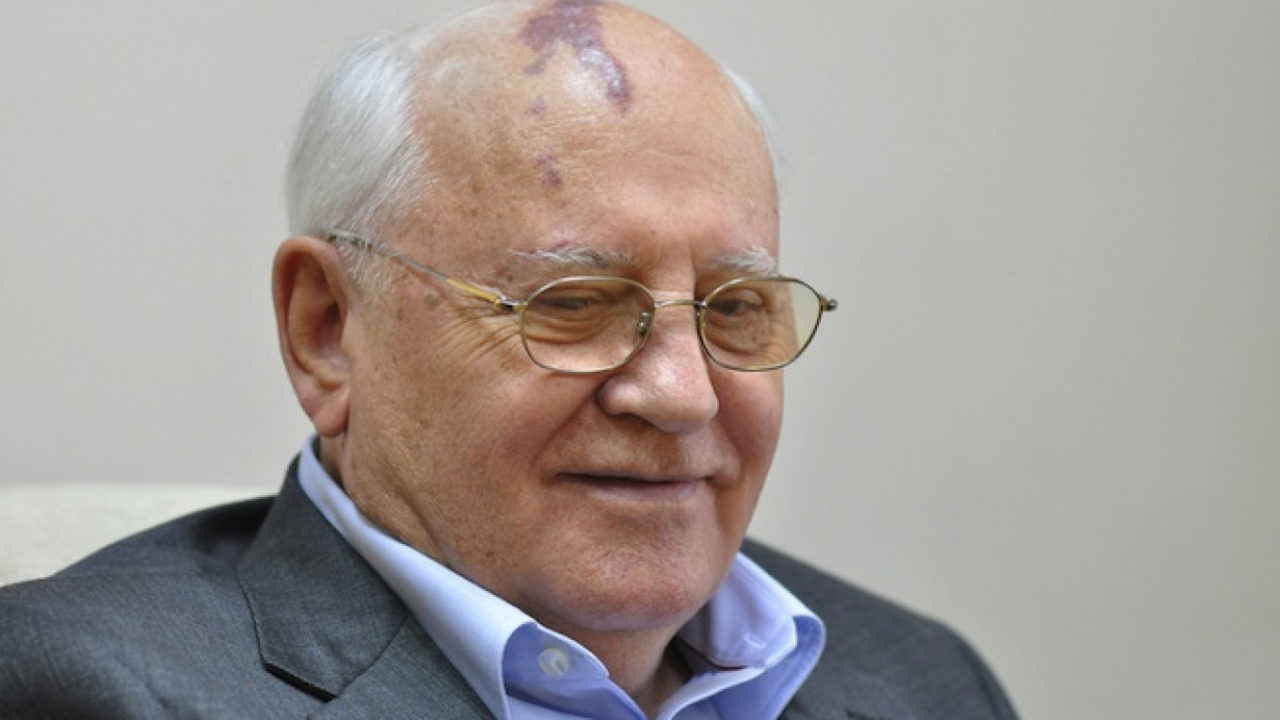
Mikhail Gorbachev
Over the past few years, Russia’s intervention in the elections and politics of other countries and the direct involvement of Russia’s current regime in the collapse of Western democratic institutions is an extremely popular topic. However, if the West is actually disintegrating owing to the clandestine dealings of certain Kremlin cooks online, then the problems themselves are attributable to the state of Western society, and not Russian hackers. All these developments are very similar to conversations about the role of the CIA in the collapse of the USSR. As is the case in the West today, the USSR collapsed from within, the problem was due to the Soviet system itself.
In general, it is important to remember today that the USSR had the world’s second most powerful army and a vast nuclear arsenal, but the state disintegrated due to its own internal factors which had nothing to do with defence capabilities — simply the abyss between society and the state was insurmountable. However, could Gorbachev have prevented such developments? When adopting far-reaching decisions, was the last General Secretary of the Communist Party of the Soviet Union governed by a certain strategy or spur-of-the-moment considerations? To what extent did he act deliberately and thoughtfully?
It is highly likely that Gorbachev simply did not anticipate such precipitous changes and such a categorical repudiation of the Soviet system. He gave people freedom of speech, while everything else was already a consequence of such a decision, everything happened almost instantaneously.
It is true that Gorbachev actually believed that socialism could be renewed. He sincerely felt that the Soviet system’s lifeless corpse could be revived. Admittedly, he made mistakes. He was wrong about some people, misunderstood and wrongly assessed the situation at certain points in time. This all happened.
Gorbachev can also be accused of failing to articulate deeply and convincingly what the new political thinking should imply for our country and the world as a whole.
However, all these factors are incomparable to his achievements. The key is that the transformations which occurred during Gorbachev’s reign in our country and the world were in actual fact indicative of a value-based revolution.
It is true that value-based institutions were not created. Gorbachev did not achieve this goal — his time in power was too short. It is also possible that he did not perceive any such need. However, new institutions based on common values have not been created during the three subsequent decades8See: Political Entropy, November 2020. . On the contrary, the concept of the “end of history” won, with the triumph of the Western democracy model of the final years of the 20th century in its congealed institutional form. Meanwhile the underlying values of this democratic model, in the absence of rigid opposition from Soviet totalitarian socialism, started to be perceived as a formality, a common place, beautiful words in actual fact totally unrelated to “realpolitik”.
However, principally different phenomena underpin the problems in the contemporary world — the cynical pragmatism of realpolitik and realeconomik. Unfortunately, these phenomena determine our lives and the modern world today. However, we will inevitably have to return to Gorbachev’s historical vectors and their underlying values. And the earlier this happens, the better.
* * *
August 1995 was the only time that Gorbachev came to my office (usually I would go to see him). On this occasion, I asked him the following question:
“Mikhail Sergeyevich, am I right in my understanding about the key thing that you did — you gave people the opportunity to speak their minds, loud and clearly? Knowing that they would not be imprisoned, lose their jobs and even be expelled from the Communist Party. And that this turned out to be sufficient for the totalitarian communist system built on lies to collapse?”
“That is right,” Gorbachev confirmed.
“In that case,” I said, “Please explain to me how you, as the General Secretary of the Central Committee of the Communist Party of the Soviet Union could come up with such an idea? How could you even think that people might be free?”
Gorbachev smiled and answered:
“Grisha, didn’t you know that my dear Raisa was a philosopher?”
—
Thank you, Mikhail Sergeyevich, for giving us freedom, for giving us the chance and opportunity to see the prospects of a truly free Russia! May you be remembered for all time!
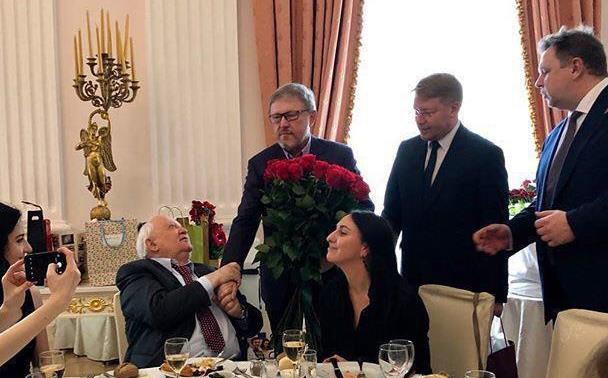
The birthday of MIkhail Gorbachev. March 2018
(The article was originally published in Russian on 2 March 2021 to commemorate the 90th birthday of Mikhail Gorbachev)



